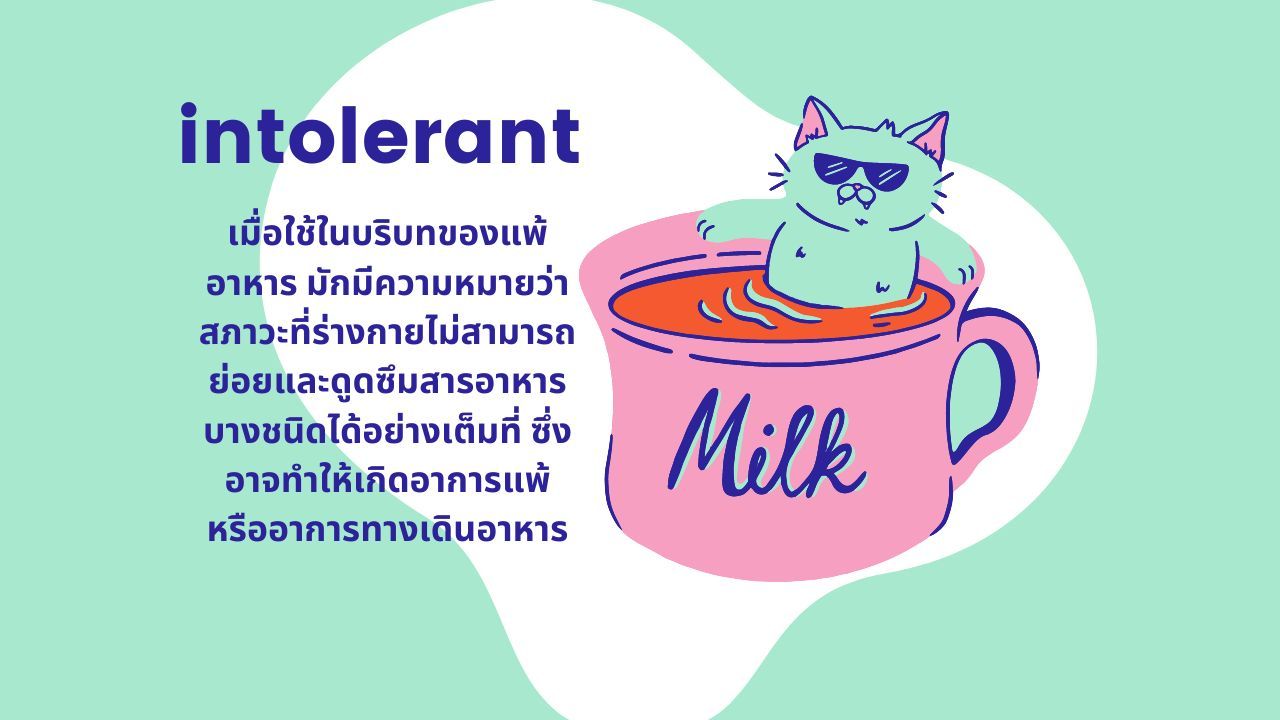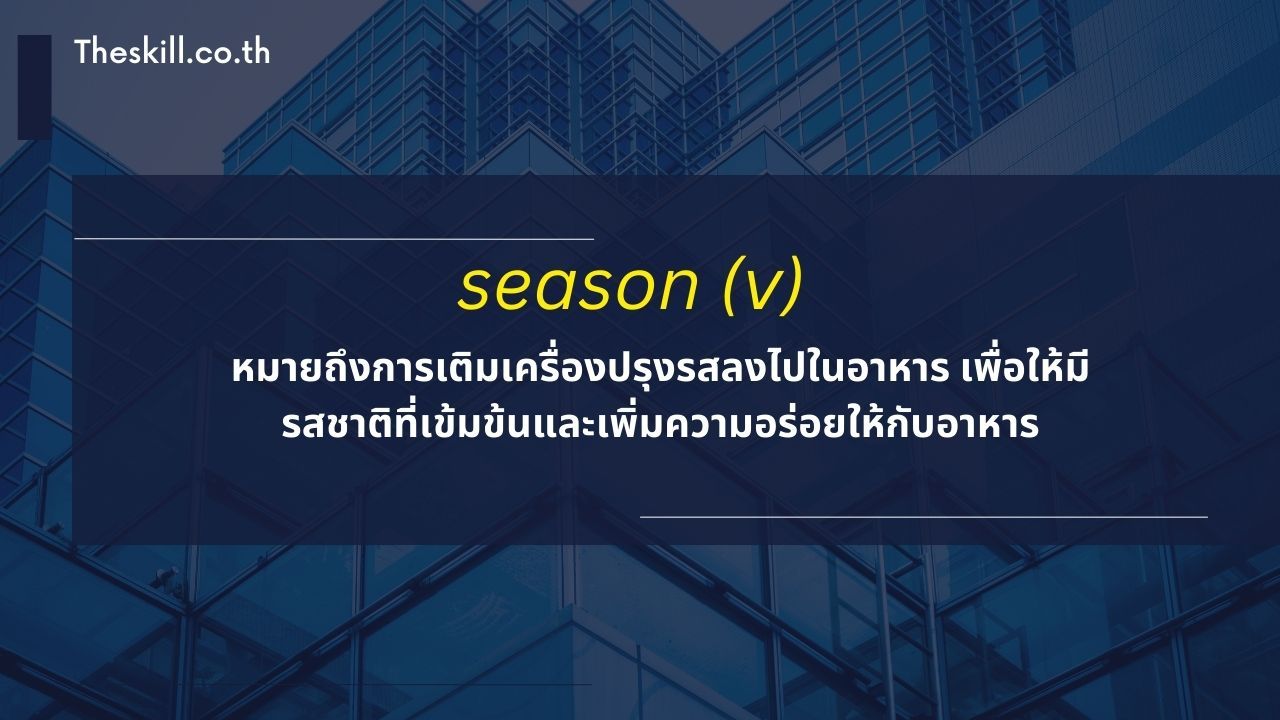💡
Minin dic คือ ดิกชั่นนารีฉบับย่อเพื่อให้ผู้เข้ามาในเว็บได้รู้คำศัพท์คำนี้อย่างคร่าวๆ
คำว่า intolerant เมื่อใช้ในบริบทของแพ้อาหาร มักมีความหมายว่า สภาวะที่ร่างกายไม่สามารถย่อยและดูดซึมสารอาหารบางชนิดได้อย่างเต็มที่ ซึ่งอาจทำให้เกิดอาการแพ้ หรืออาการทางเดินอาหาร อาจเกิดอาการปวดท้อง ท้องผูก ท้องเสีย หรืออาจมีผื่นแดงบริเวณผิวหนัง เป็นต้น
ตัวอย่างประโยค:
💡
ตัวอย่างประโยค:
Intolerant
0:00
/52.032
I'm lactose intolerant, so I can't have any milk or cheese. (ฉันแพ้แลคโตส ดังนั้นฉันไม่สามารถทานนมหรือชีสได้)
He is gluten intolerant and has to avoid eating bread or pasta. (เขาแพ้กลูเต็นและต้องหลีกเลี่ยงการรับประทานขนมปังหรือพาสต้า)
Some people are intolerant to certain types of seafood, such as shellfish or shrimp. (บางคนแพ้อาหารทะเลบางชนิด เช่น หอย หรือกุ้ง)
คำเหมือน คำต่าง
💡
คำเหมือน คำต่าง
Synonyms: sensitive, allergic
Antonyms: tolerant, immune
💡
คำศัพท์ที่เกี่ยวข้อง ในบทเรียน
- Lactose intolerant (แพ้อาหารที่มีแลคโตส) - Adjective: Unable to digest foods containing lactose.
- Milk (นม) - Noun: A white liquid produced by mammals for nourishing their young.
- Cheese (ชีส) - Noun: A dairy product made from milk curds.
- Gluten intolerant (แพ้อาหารที่มีกลูเตน) - Adjective: Unable to tolerate foods containing gluten.
- Avoid (หลีกเลี่ยง) - Verb: To stay away from or not engage in something.
- Eating (การรับประทาน) - Noun: The act of consuming food.
- Bread (ขนมปัง) - Noun: A staple food made from baked dough.
- Pasta (พาสต้า) - Noun: A type of food made from flour, water, and sometimes eggs.
- Seafood (อาหารทะเล) - Noun: Edible creatures from the sea.
- Certain types (ชนิดบางชนิด) - Noun: Specific categories.
- Shellfish (หอย) - Noun: Aquatic animals with shells, such as clams, mussels, and oysters.
- Shrimp (กุ้ง) - Noun: Small, edible crustaceans.
- People (ผู้คนคน) - Noun: Individuals, human beings.
💡
คำที่มีความหมายคล้ายกับ intolerant
🔮 รายละเอียดเพิ่มเติม (ย่อ - ขยาย ) ---- > Click
- Bigoted (ซึ่งมีความเชื่อฝังหัวและไม่ยอมรับความแตกต่าง) - This word strongly implies a prejudiced attitude towards a particular group of people based on their race, religion, gender, etc.
- "The politician's bigoted remarks about immigrants were widely condemned." (คำพูดที่แสดงความเชื่อฝังหัวและไม่ยอมรับผู้อพยพของนักการเมืองถูกประณามอย่างกว้างขวาง)
- Narrow-minded (ใจแคบ) - This suggests a lack of openness to new ideas or ways of thinking. It's often used in a general sense.
- "His narrow-minded views prevented him from seeing the benefits of cultural diversity." (ทัศนคติที่ใจแคบของเขาทำให้เขาไม่เห็นประโยชน์ของความหลากหลายทางวัฒนธรรม)
- Small-minded (ใจแคบ, ขี้เหนียว, จุกจิก) - Similar to narrow-minded, but can also imply pettiness or a concern with trivial matters.
- "Don't be so small-minded; try to see the bigger picture." (อย่าใจแคบนักเลย พยายามมองภาพรวมให้กว้างขึ้น)
- Parochial (คับแคบ, เกี่ยวกับท้องถิ่น) - This often refers to a limited or narrow outlook, as if one's world is confined to a small local area.
- "The debate suffered from a parochial focus, ignoring broader international trends." (การอภิปรายมีมุมมองที่คับแคบ โดยละเลยแนวโน้มระดับนานาชาติที่กว้างกว่า)
- Provincial (บ้านนอก, คับแคบ) - Similar to parochial, suggesting a lack of sophistication or awareness of the wider world.
- "Her provincial attitudes seemed out of place in the cosmopolitan city." (ทัศนคติแบบบ้านนอกของเธอ ดูไม่เข้ากับเมืองใหญ่ที่มีความเป็นสากล)
- Insular (คับแคบ, เหมือนเกาะที่ตัดขาดจากโลกภายนอก) - This implies being isolated and therefore unaware or uninterested in outside ideas or cultures.
- "The community became increasingly insular, resisting any outside influence." (ชุมชนเริ่มมีความเป็นพวกเดียวกันมากขึ้น เรื่อยๆ และต่อต้านอิทธิพลจากภายนอก)
- Blinkered (ใส่ที่ครอบตา, มองอะไรด้านเดียว) - This suggests a limited perspective, as if wearing blinders that prevent one from seeing other viewpoints.
- "His blinkered approach to the problem meant he couldn't find creative solutions." (วิธีการมองปัญหาด้านเดียวของเขา ทำให้เขาไม่สามารถหาทางออกที่สร้างสรรค์ได้)
- Illiberal (ไม่เสรีนิยม, หัวรั้น) - This refers to someone who is against liberal principles, such as freedom of thought and expression, and often intolerant of different lifestyles or beliefs.
- "The party's illiberal policies sparked widespread protests." (นโยบายที่ไม่เสรีนิยมของพรรคจุดชนวนให้เกิดการประท้วงอย่างกว้างขวาง)
- Inflexible (ไม่ยืดหยุ่น) - This describes someone who is unwilling to change their opinions or ways of doing things, often leading to intolerance of different approaches.
- "His inflexible attitude made it difficult to reach a compromise." (ทัศนคติที่ไม่ยืดหยุ่นของเขาทำให้ยากที่จะประนีประนอม)
- Dogmatic (ดันทุรัง, เชื่อมั่นในหลักการตัวเองอย่างไม่ลืมหูลืมตา) - This refers to someone who holds rigidly to their beliefs and is unwilling to consider other viewpoints.
- "She held dogmatic views on education and refused to discuss alternatives." (เธอมีความเชื่อที่ดันทุรังเกี่ยวกับเรื่องการศึกษาและปฏิเสธที่จะพูดคุยถึงทางเลือกอื่น)
- Rigid (แข็งกระด้าง, ไม่ยืดหยุ่น) - Similar to inflexible and dogmatic, emphasizing a lack of adaptability and unwillingness to change.
- "The company's rigid rules made it difficult to respond to changing market conditions." (กฎระเบียบที่แข็งกระด้างของบริษัททำให้ยากที่จะตอบสนองต่อสภาวะตลาดที่เปลี่ยนแปลงไป)
- Uncompromising (ไม่ยอมประนีประนอม) - While sometimes a positive trait, in the context of intolerance, it means being unwilling to make concessions or accept differing opinions.
- "His uncompromising stance on the issue led to a stalemate." (จุดยืนที่ไม่ยอมประนีประนอมของเขาในประเด็นนี้ทำให้เกิดภาวะชะงักงัน)
- Unforgiving (ไม่ให้อภัย) - This describes someone who is unwilling to pardon or excuse the mistakes or differences of others, often stemming from intolerance.
- "The unforgiving nature of the law left little room for leniency." (ลักษณะที่ไม่ยอมให้อภัยของกฎหมายทำให้ไม่มีช่องว่างสำหรับความเมตตา)
- Unsympathetic (ไม่เห็นอกเห็นใจ) - This refers to a lack of understanding or compassion for others, which can be a component of intolerance towards their struggles or differences.
- "He was unsympathetic to their plight and offered no assistance." (เขาไม่เห็นอกเห็นใจต่อความยากลำบากของพวกเขาและไม่ให้ความช่วยเหลือใดๆ)







